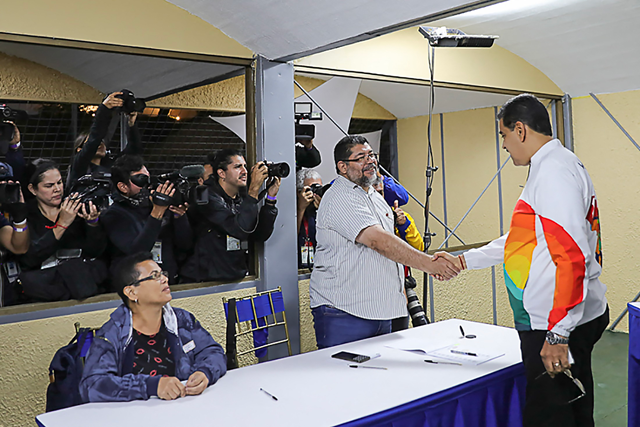You are here
Venezuela, Guyana leaders meet to 'de-escalate' tensions
By AFP - Dec 14,2023 - Last updated at Dec 14,2023

This handout photo released by the Venezuelan Presidency shows Venezuela's President Nicolas Maduro (left) talking with Prime Minister of Saint Vincent and the Grenadines Ralph Everard Gonsalves (right) after his arrival at the Argyle International Airport in Saint Vincent and The Grenadines on Thursday (AFP photo)
CARACAS — The presidents of Venezuela and Guyana met on Thursday in the Caribbean for talks that analysts say could "de-escalate" tensions but will do little to resolve their countries' long-standing — and now reheating — territorial dispute.
A short video from the Venezuelan government showed its leader Nicolas Maduro and Guyana's Irfaan Ali sitting down to discuss Caracas's claim on oil-rich Essequibo, which makes up more than two-thirds of neighboring Guyana.
The meeting is taking place in Saint Vincent and the Grenadines after months of escalating discord that has raised fears in the region of a potential conflict over the remote area of 160,000 square kilometres.
Maduro's government held a controversial referendum on December 3 in which 95 per cent of voters, according to officials in the hard-line leftist government, supported declaring Venezuela the rightful owner of Essequibo.
He has since started legal maneuvers to create a Venezuelan province in Essequibo and ordered the state oil company to issue licenses for extracting crude in the region — moves Ali branded as a "grave threat to international peace and security."
The two leaders have voiced sharply opposing views of the talks.
Maduro has hailed the meeting as a way to directly address the territorial controversy, promising on Thursday on arrival that Venezuela would "defend our rights".
Ali has said he will not discuss the border dispute and insists it should be resolved at the International Court of Justice, whose jurisdiction is not recognised by the Venezuelan government.
“I’m taking in the facts with me,” Guyanese media quoted Ali as saying ahead of the talks.
‘Nothing substantive’
Prior to the meeting Maduro and Ali met separately with representatives of the Caribbean Community (CARICOM) bloc.
“I think nothing substantive is going to come out in terms of the territorial claim, since Guyana’s position is that there are no bilateral talks on the issue, because that is in the International Court of Justice,” Sadio Garavini di Turno, former Venezuelan ambassador to Guyana, told AFP.
He said a best-case scenario would be a joint statement in which both sides commit “to lower the escalation” and agree that “they are going to continue talking to lower tensions”.
Guyana has taken the case to the UN Security Council and approached military “partners”, including the United States, which has carried out joint military exercises in Essequibo.
Brazilian President Luiz Inacio Lula da Silva, invited to the talks at both sides’ request, has backed a peaceful solution and warned Maduro against “unilateral measures that could escalate the situation”.
Brazil, which borders both countries, has also reinforced its troops around the area.
“If this meeting is going to be useful to talk about eradicating the idea of going to an armed conflict, then I welcome it,” Ramon Escovar Leon, a lawyer specialised in international litigation told AFP.
Oil, a point of conflict
The decades-old dispute intensified after ExxonMobil discovered oil in Essequibo in 2015, helping give Guyana — which has a population of 800,000 — the world’s biggest crude reserves per capita.
The Venezuelan government’s anti-imperialist rhetoric has seen it accuse Ali of being “a slave” of ExxonMobil.
On Monday, Venezuelan Foreign Minister Yvan Gil told reporters there could be talk of “cooperation in oil and gas matters”.
Gil cited the Petrocaribe agreements, under which Venezuela supplies crude oil at preferential prices to Caribbean countries, and gas deals with Trinidad and Tobago.
He said these were “concrete examples” that “could serve as a basis for future agreements with the Cooperative Republic of Guyana”.
The row has other South American nations on edge.
Argentina, Brazil, Chile, Colombia, Ecuador, Paraguay, Peru and Uruguay issued a joint declaration calling for “both parties to negotiate to seek a peaceful solution”.
Colombian President Gustavo Petro warned the situation was potentially explosive.
“The biggest misfortune that could hit South America would be a war,” he wrote on social media.
Related Articles
BRASÍLIA — The foreign ministers of Guyana and Venezuela met on Thursday in Brazil’s capital city to discuss the simmering crisis on their b
CARACAS — A British warship arrived off the coast of Guyana on Friday, further fuelling tensions over a territorial dispute with Venezuela,
CARACAS — Venezuelans began voting on Sunday in a referendum that the government hopes will strengthen its century-old claim to the oil-rich
















